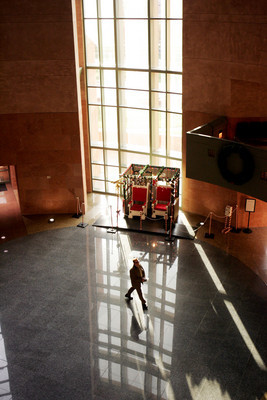County officials look for savings
A white sedan rolling by a parking shelter seems insignificant.
But the scene reveals a couple of facets of Clark County's new plan for sustaining environmental resources.
The car is one of seven gas-electric hybrids in the county's growing fleet, while the parking shelter someday will have solar panels for generating electricity at the Clark County Government Center.
County officials say they want sustainability to be more than a buzzword or a noble-sounding idea. Drafting a plan and creating a central hub within the county to foster eco-friendly practices were the first steps, officials say.
Obtaining grants and getting more people involved will be the next larger tasks.
"We don't want this to be a document to take up space on a shelf and then is forgotten," said Alan Pinkerton, deputy director of the county's Air Quality and Environmental Management. "We want this (program) to be an example of what can happen."
Pinkerton and Robert Tekniepe, a management analyst in the air-quality department, make up the new, two-person Sustainability Office.
Neither are paid extra for the work, nor will they hire new employees in the foreseeable future, said Pinkerton, noting that the county is not spending any local tax dollars on the program.
The two men must fit the program's duties into their normal work schedules.
Approved by commissioners two months ago, the sustainability plan adds more details and specifics to the broad goals outlined in the "eco-county initiative" of 2007.
It describes ways to conserve energy, reduce waste and ultimately save money, Pinkerton said.
"It puts more meat on the bone," he said
One longer-range goal is to put tinted plastic on windows to reduce sunlight and ease demand on air conditioners.
Another is to mount solar panels atop covered parking areas, similar to how the Las Vegas Valley Water District installed solar sheaths on parking shelters at the Springs Preserve.
The plan also calls for expanding the use of gray water for irrigation at offices and homes.
Department heads also are encouraged to print documents on both sides of paper, burn less fuel and recycle as much as possible.
Creating a central office in the county was important because it will help organize various departments in their efforts to be more green, Tekniepe said.
The county is exploring grants from the Environmental Protection Agency and the National Science Foundation to fund the program, Pinkerton said.
A conservation advocate said the county seems serious about fleshing out the eco-initiative with real actions and attainable goals.
"These eco-initiatives -- a lot of times they end up as a grand vision" with nothing to back them up, said Scot Rutledge, executive director of the Nevada Conservation League.
Conserving resources is not just about being kind to the environment. It also saves taxpayers' money while in the throes of a weak economy, Rutledge said.
Improving sustainability can also create jobs, he said, because someone has to install solar panels or gray-water systems.
"We've moved past the old paradigm that what's good for the environment is bad for business," he said.
Portions of the sustainability plan borrow some broad and overarching goals from the eco-initiative. For instance, it recommends that the county coordinate with federal, state and local agencies to deal with climate change.
The county plans to do a thorough inventory of everything that emits greenhouse gases while taking steps to curb those emissions, Tekniepe said.
Employees will be encouraged to drive less by telecommuting, videoconferencing and working a four-day week, he said. The county also is looking to use more gas-stingy work vehicles.
By state law, no more than 10 percent of the county's fleet can be hybrid, Tekniepe said. The county is turning more to vehicles that run on alternative fuels, and so far has bought 13 that are powered by compressed natural gas.
The county also plans to encourage contractors to construct green buildings that are Leed certified, he said. Leed certification is the most respected industry standard for eco-friendly buildings.
And crews have begun replacing high-mercury streetlights with more efficient sodium lights, and installing fluorescent lights indoors whenever possible, he said. Eventually, long-lasting, power-saving LEDs -- light-emitting diodes -- will be widely used, though that will depend on funding, he said.
The county aims to work with the cities in a joint effort to improve sustainability, perhaps by recycling more trash or paving roads with reused asphalt, he said.
In April, the two-person sustainability team will present a report to county commissioners on how much each measure would cost to implement, and how long each one might take to materialize.
Tekniepe said he hopes commissioners will get behind the plan when they see the immediate goals will demand little or no money.
"We're going to move something forward because it has to be done," Tekniepe said. "I'm actually looking for concrete results."
Contact reporter Scott Wyland at swyland@reviewjournal.com or 702-455-4519.

















